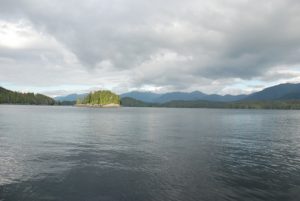 Outrage is the only word for what people are feeling after a tug and fuel barge, owned by Texas-based Kirby Offshore Marine, crashed on rocks in the heart of B.C.’s Great Bear Rainforest on October 13. It’s been leaking 200,000 litres (59, 024 gallons) of diesel fuel into the sensitive marine ecosystem ever since.
Outrage is the only word for what people are feeling after a tug and fuel barge, owned by Texas-based Kirby Offshore Marine, crashed on rocks in the heart of B.C.’s Great Bear Rainforest on October 13. It’s been leaking 200,000 litres (59, 024 gallons) of diesel fuel into the sensitive marine ecosystem ever since.
The 30-metre Nathan E. Stewart tug was pushing the empty fuel barge DBL 55 south from Alaska where it had dropped off its petroleum cargo of 52,000 barrels of oil. It was operating without a local pilot in the complicated waters of the spectacular Inside Passage.
Only three weeks ago, the Duke and Duchess of Cambridge, Prince William and Kate Middleton, had visited the Great Bear Rainforest near Bella Bella, B.C. and were hosted there by the Heiltsuk First Nation, who have extensive clam, herring, salmon and other fisheries in the region now threatened by the sunken tug’s oil slick.
The Great Bear Rainforest is the largest remaining tract of intact temperate rainforest in the world. It is home to Sandhill cranes, grizzly bears, grey wolves, humpback and orca whales, giant conifers, every species of wild salmon, and many other wild species.
Ingmar Lee, an environmental activist who owns a popular eco-tourism business called C’idawai Point Cabins near Bella Bella, told me by email on Oct. 16 that there is “a veritable holocaust of helicopters flying over our house here at first light this morning. Texas personnel are out there shovelling money in any direction they can.”
Meanwhile, “there are a large number of huge vessels languishing around on-scene, trying desperately to look busy, as though they’re doing something, anything,” and a dozen people are deploying pads and stringing booms “which are utterly useless in containing the damage.”
More than a year ago, Lee had told a reporter that the Nathan E. Stewart tug was a “disaster waiting to happen.”
At the site of the grounding, Kelly Brown, director of the Heiltsuk Integrated Resource Management Department, told Global News on Oct. 14, “It’s really bad out here. A lot of fuel is on the beach already, and fuel is in the water.” Brown also called the initial response to the spills “totally inadequate. The first responding vessels were not equipped to deal with a spill, and had to return to town to gather more gear,” he said. “The Heiltsuk are providing our own equipment because what responders have been able to provide so far is insufficient.” [1]
Petroleum Conduit
The crash and its environmental impacts have drawn widespread criticism from First Nations and others, who are questioning the inadequate spill response measures and the diminished Canadian Coast Guard presence on the entire B.C. coast.
Kelly Russ, Chair of the Coastal First Nations, released a statement saying, “To prevent another tragic event like this, the Heiltsuk First Nation must be a full partner in the inquiry to come into what went wrong, not just presenting evidence. This must include First Nations involvement in any future decision-making about ship traffic transiting territorial waters.” [2]
Others – especially Ingmar Lee – are questioning “the pilotage exemption” and the very existence of this little-known tug and barge “petroleum conduit” to Alaska.
According to CBC News, “U.S. vessels that are under 10,000 gross tonnage, such as the Nathan E. Stewart, are often allowed to operate without a local pilot on the West Coast of Canada, if the crew meets a minimum standard of experience and licensing, said Kevin Obermeyer, CEO for the Pacific Pilotage Authority.” [3]
Such a waiver – an exemption from the requirements of the Canada Shipping Act – had been given to the Nathan E. Stewart, which made weekly trips through the Inside Passage to deliver oil to Alaska. This tug/barge unit was just one of many such units that run up and down B.C.’s Inside Passage to deliver petroleum products to Alaska.
According to Bloomberg News, Texas-based Kirby Offshore Marine as of 2010 is operating 57 tank barges and 64 tugboats similar to the Nathan E. Stewart, which now sits at the bottom of Seaforth Channel near Bella Bella.
Ingmar Lee has been trying for a long time to get Captain Kevin Obermeyer to stop handing out waivers to all the U.S. tug/barge traffic using the Inside Passage for oil delivery.
In an Oct. 16 email, Ingmar Lee states that Obermeyer “has issued more than 60 waivers to this Alaska tanker traffic which is using the B.C. Inside Passage as its petroleum conduit.” He adds, “I have implored Obermeyer to use his significant powers” to order all this American tug/barge oil traffic out of the Inside Passage, “make them get a proper offshore capable tanker (such as a 300,000 deadweight ton capacity Aframax tanker) and do one or two trips 20 miles offshore, just like all the other tankers must do.”
His email continues: “When I ask Obermeyer to shut down this threat to this coast, he conflates the American traffic with our comparatively insignificant local domestic coastal fuel deliveries and says he’d have to shut down both. I call that bullshit. Obermeyer tells me that ‘the Oregon Treaty’ (a gruesome colonial document decreed in 1846) has established the B.C. Inside Passage as ‘open water,’ an ‘international waterway’.”
Ignoring the Problem
Lee also says that despite his many months of efforts to alert people, “professional B.C. ENGOs” have long been simply ignoring the problem of this petroleum conduit, even though “it is, in fact, the single biggest possible threat to the so-called Great Bear Rainforest that all these ENGOs are falling all over themselves with pride to have ‘protected’. None of them have got the slightest comprehension of the problem.”
The wreck of the Nathan E. Stewart may change that.
Meanwhile, Ingmar Lee states, “I can tell you all right now that, as we speak, Kirby Corporation [Kirby Offshore Marine] and ilk are already loading the very next 10,000 deadweight ton tanker, and are about to start the voyage north. They will fill their tanker, either at the Kinder Morgan Westridge terminal, or at the Tesoro Anacortes terminal, and will then begin their traverse of the Salish Sea, passing through beautiful Sabine Channel between Texada and Lasqueti Islands, and on past Campbell River, right through the dangerous ship-eating tidal maelstrom of Seymour Narrows, on up through Johnstone Strait, through Blackfish Sound, and on past the open-ocean Cape Caution, Fitzhugh Channel, and on past Bella Bella and steaming directly through the ongoing slick being still puked out of their fellow ship…past Klemtu, Hartley Bay…up Grenville Channel, past Prince Rupert and on to Alaska. They will pay no Canadian fee, they will employ no Canadian, they will have no Canadian pilot, and there will be no stops in Canada.”
With regard to the “clean-up” effort underway that is being touted by the CBC and other media outlets, Lee tells me that Kirby Offshore Marine seems to be “sanitizing the public airways.”
He adds, “Please don’t miss writing about the tanker-scale good-news PR-tsunami that is now in full swing.”
Footnotes:
[1] Yuliya Talmazan, “Tug boat and fuel barge run around near Bella Bella: crew rescued, leak reported,” Global News, October 14, 2016.
[2] Bethany Lindsay, “Feds revoke petroleum barge’s rights to ply B.C. coast without Canadian pilot after grounding,” PostMedia News, October 13, 2016.
[3] Megan Thomas, “Clam beds at risk after siking tug spills fuel near Bella Bella, says local First Nation,” CBC News, October 13, 2016.
Sourced from: counterpunch.org
